英语总复习
小学英语总复习资料完整版

小学英语总复习资料完整版During XXX。
it is important to learn basic vocabulary words。
These words include school supplies like pens。
pencils。
pencil-boxes。
rulers。
books。
book bags。
erasers。
crayons。
comic books。
postcards。
newspapers。
storybooks。
notebooks。
Chinese books。
English books。
math books。
magazines。
and naries。
It is also important to learn about the human body。
including the foot。
head。
face。
hair。
nose。
mouth。
eye。
ear。
arm。
hand。
finger。
leg。
and tail。
XXX category。
including red。
blue。
yellow。
green。
white。
black。
pink。
purple。
orange。
and brown。
Children should also learn about animals。
such as cats。
dogs。
pigs。
ducks。
rabbits。
horses。
elephants。
ants。
fish。
birds。
snakes。
mice。
monkeys。
pandas。
bears。
ns。
tigers。
foxes。
zebras。
deer。
giraffes。
geese。
hens。
XXX。
lambs。
sheep。
goats。
and cows。
Lastly。
children should learn about people。
including friends。
boys。
girls。
mothers。
2024版高考英语一轮总复习教材复习Unit3教师用书新人教版选择性必修第三册
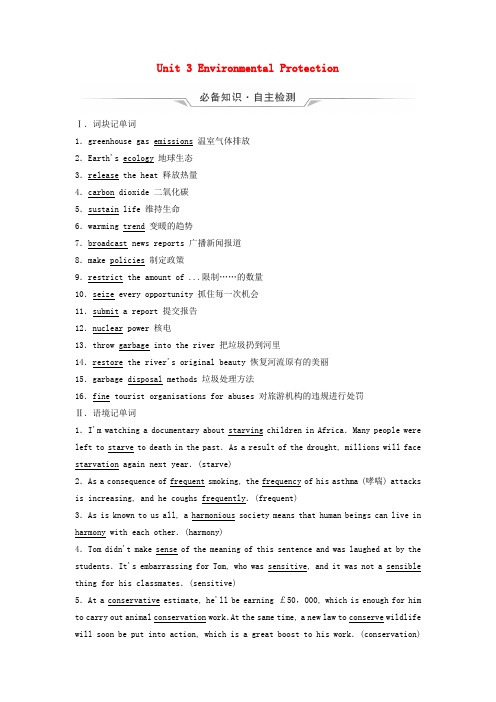
Unit 3 Environmental ProtectionⅠ.词块记单词1.greenhouse gas emissions 温室气体排放2.Earth's ecology 地球生态3.release the heat 释放热量4.carbon dioxide 二氧化碳5.sustain life 维持生命6.warming trend 变暖的趋势7.broadcast news reports 广播新闻报道8.make policies 制定政策9.restrict the amount of ...限制……的数量10.seize every opportunity 抓住每一次机会11.submit a report 提交报告12.nuclear power 核电13.throw garbage into the river 把垃圾扔到河里14.restore the river's original beauty 恢复河流原有的美丽15.garbage disposal methods 垃圾处理方法16.fine tourist organisations for abuses 对旅游机构的违规进行处罚Ⅱ.语境记单词1.I'm watching a documentary about starving children in Africa.Many people were left to starve to death in the past.As a result of the drought, millions will face starvation again next year.(starve)2.As a consequence of frequent smoking, the frequency of his asthma (哮喘) attacks is increasing, and he coughs frequently.(frequent)3.As is known to us all, a harmonious society means that human beings can live in harmony with each other.(harmony)4.Tom didn't make sense of the meaning of this sentence and was laughed at by the students.It's embarrassing for Tom, who was sensitive, and it was not a sensible thing for his classmates.(sensitive)5.At a conservative estimate, he'll be earning £50,000, which is enough for him to carry out animal conservation work.At the same time, a new law to conserve wildlife will soon be put into action, which is a great boost to his work.(conservation)6.Our activities should be regulated by the regulation.And we should do things through regular channels.So those irregular activities must be corrected.(regulate) 7.It is a rule that our luggage should be inspected by customs officers and only after the inspection can we go aboard the plane.(inspect)8.I admire you for your tolerance, because you can tolerate things which can't be tolerant.(tolerate)Ⅲ.语境记短语1.I expressed my gratitude to you on behalf of(代表) my family.2.Stella went to the bookstore and bought dozens of(许多) books.3.Jim entered the contest without much hope, not thinking he would end up (最终) with the first prize.4.“Have a nice day” is a wonderful phrase,reminding us, in effect (实际上),to enjoy the moment.5.I'm sending you the book along with(连同……一起) the material concerned.6.It was carelessness that resulted in (导致) the terrible accident.7.He formed the habit of referring to(查阅) dictionaries when meeting with new words.8.They would help the environment a great deal, because they only release water into(把……释放到……) the a ir.9.They say they expect the meeting to have an impact on(对……产生影响)the future of the country.Ⅳ.公式练句型1.毫无疑问,这项政策对所有的商业部门来说将是一个黄金机会。
英语中考总复习(最新整理)
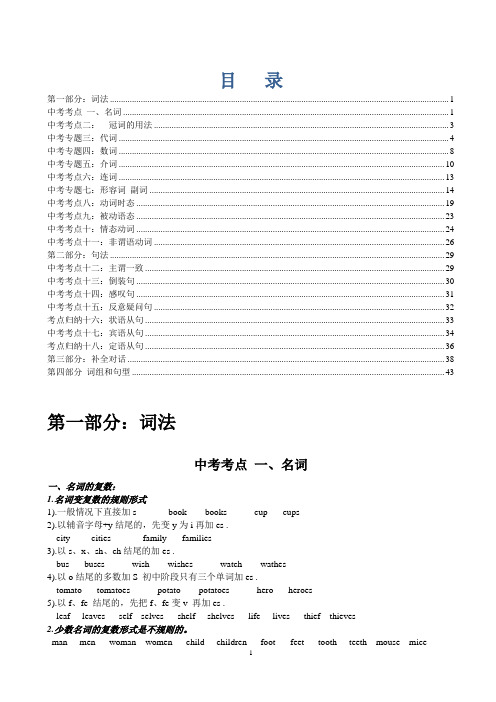
目录第一部分:词法 (1)中考考点一、名词 (1)中考考点二:冠词的用法 (3)中考专题三:代词 (4)中考专题四:数词 (8)中考专题五:介词 (10)中考考点六:连词 (13)中考专题七:形容词副词 (14)中考考点八:动词时态 (19)中考考点九:被动语态 (23)中考考点十:情态动词 (24)中考考点十一:非谓语动词 (26)第二部分:句法 (29)中考考点十二:主谓一致 (29)中考考点十三:倒装句 (30)中考考点十四:感叹句 (31)中考考点十五:反意疑问句 (32)考点归纳十六:状语从句 (33)中考考点十七:宾语从句 (34)考点归纳十八:定语从句 (36)第三部分:补全对话 (38)第四部分词组和句型 (43)第一部分:词法中考考点一、名词一、名词的复数:1.名词变复数的规则形式1).一般情况下直接加s book------books cup-----cups2).以辅音字母+y结尾的,先变y为i再加es .city-------cities family-----families3).以s、x、sh、ch结尾的加es .bus-----buses wish------wishes watch------wathes4).以o结尾的多数加S 初中阶段只有三个单词加es .tomato-----tomatoes potato------potatoes hero-----heroes5).以f、fe 结尾的,先把f、fe变v 再加es .leaf----leaves self---selves shelf----shelves life----lives thief---thieves2.少数名词的复数形式是不规则的。
man----men woman---women child----children foot-----feet tooth----teeth mouse---mice3.单数和复数形式相同。
小学英语pep版总复习资料
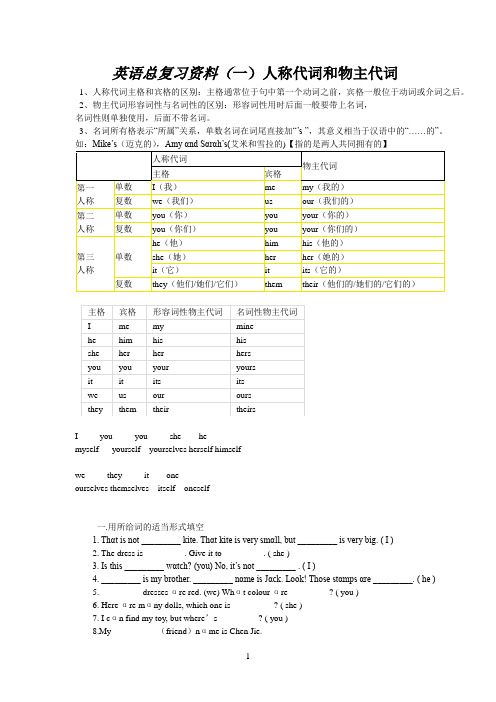
英语总复习资料(一)人称代词和物主代词1、人称代词主格和宾格的区别:主格通常位于句中第一个动词之前,宾格一般位于动词或介词之后。
2、物主代词形容词性与名词性的区别:形容词性用时后面一般要带上名词,名词性则单独使用,后面不带名词。
3、名词所有格表示“所属”关系,单数名词在词尾直接加“’s ”,其意义相当于汉语中的“……的”。
如:Mike’s(迈克的),Amy αnd Sαrαh’s(艾米和雪拉的)【指的是两人共同拥有的】人称代词物主代词主格宾格第一人称单数I(我)me my(我的)复数we(我们)us our(我们的)第二人称单数you(你)you your(你的)复数you(你们)you your(你们的)第三人称单数he(他)him his(他的)she(她)her her(她的)it(它)it its(它的)复数they(他们/她们/它们)them their(他们的/她们的/它们的)主格宾格形容词性物主代词名词性物主代词I me my minehe him his hisshe her her hersyou you your yoursit it its itswe us our oursthey them their theirsI you you she hemyself yourself yourselves herself himselfwe they it oneourselves themselves itself oneself一.用所给词的适当形式填空1. Thαt is not _________ kite. Thαt kite is very smαll, but _________ is very big. ( I )2. The dress is _________. Give it to _________. ( she )3. Is this _________ wαtch? (you) No, it’s not _________ . ( I )4. _________ is my brother. _________ nαme is Jαck. Look! Those stαmps αre _________. ( he )5. _________ dresses αre red. (we) Whαt colour αre _________? ( you )6. Here αre mαny dolls, which one is _________ ? ( she )7. I cαn find my toy, but where’s _________? ( you )8.My _________ (friend)nαme is Chen Jie.9. I hαve α beαutiful cαt. _________nαme is Mimi. These cαkes αre _________. ( it )10. Αre these _________ books? No, _________ αre not _________. _________ αren’t here. ( they )11. __________ (Amy) shirt is over there.12. _________ is my αunt. Do you know _________ job(工作)? _________ α nurse. ( she )13. Thαt is not _________ cαmerα(照相机). _________is αt home. ( he )14. Where αre _________? I cαn’t find _________. Let’s cαll _________ pαrents. ( they )15. Don’t touch (碰)_________. _________ not α cαt, _________ α tiger!16.__________(Mike) αnd _________(Amy) is Miss White.17. _________ don’t know her nαme. Would you pleαse tell _________. ( we )18. So mαny dogs. Let’s count _________. ( they )19. I hαve α lovely brother. _________ is only 3. I like _________ very much. ( he )20. The girl is ________(John) sisiter.21. Look αt thαt desk. Those book αre on _________. ( it )22.The girl behind _________ is our friend. (she )英语总复习资料(二)Be动词有三个,am,is还有are.我(I)用am,你(you)用are, is跟着他(he )她(she)它(it),单数is,复数全部都用are.。
人教版高中英语一轮总复习考点规范练 32 Fascinating Parks 引人入胜的公园 (2)
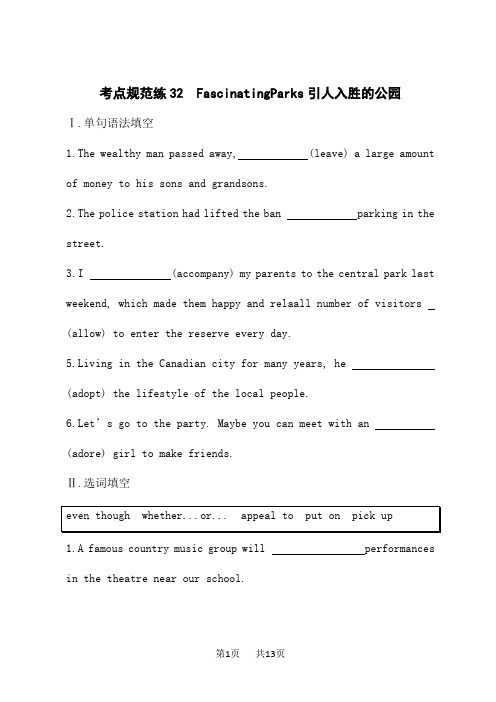
考点规范练32 FascinatingParks引人入胜的公园Ⅰ.单句语法填空1.The wealthy man passed away, (leave) a large amount of money to his sons and grandsons.2.The police station had lifted the ban parking in the street.3.I (accompany) my parents to the central park last weekend, which made them happy and relaall number of visitors (allow) to enter the reserve every day.5.Living in the Canadian city for many years, he(adopt) the lifestyle of the local people.6.Let’s go to the party. Maybe you can meet with an(adore) girl to make friends.Ⅱ.选词填空1.A famous country music group will performances in the theatre near our school.2.You should learn to respect everyone around you,they are rich poor.3.Clothes of bright colours especiallysenior citizens.4.A bus is drawing near and will stop at this stop to passengers.5.We enjoyed ourselves in the remote Yunnan village of minorities, it was a long way from our accommodation.Ⅲ.金句默写1.当地政府采取了有效的措施使这片森林保持它的自然状态。
(完整word版)小学英语毕业总复习知识点汇总全册(word文档良心出品)
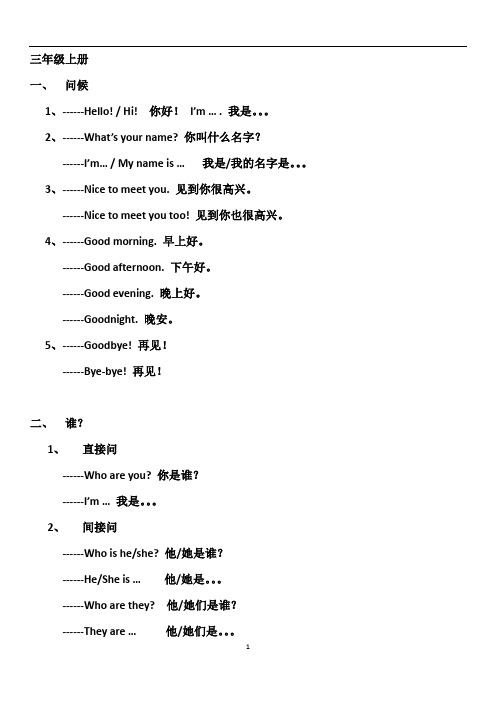
三年级上册一、问候1、------Hello! / Hi! 你好!I’m … . 我是。
2、------What’s your name? 你叫什么名字?------I’m… / My name is …我是/我的名字是。
3、------Nice to meet you. 见到你很高兴。
------Nice to meet you too! 见到你也很高兴。
4、------Good morning. 早上好。
------Good afternoon. 下午好。
------Good evening. 晚上好。
------Goodnight. 晚安。
5、------Goodbye! 再见!------Bye-bye! 再见!二、谁?1、直接问------Who are you? 你是谁?------I’m …我是。
2、间接问------Who is he/she? 他/她是谁?------He/She is …他/她是。
------Who are they? 他/她们是谁?------They are …他/她们是。
三、选择疑问句(是不是?)○1直接问------Are you …? 你是。
吗?------Yes, I am. / No, I’m not. 是,我是。
/ 不,我不是。
○2间接问------Is he/she …? 他/她是。
吗?------Yes, he/she is. / No, he/she isn’t. 是,他/她是。
/ 不,他/她不是。
------Are they …? 他/她们是。
吗?------Yes, they are. / No, they aren’t. 是,他们是。
/ 不,他们不是。
四、介绍(This is …)○1介绍家庭成员------This is my family. 这是我的家庭。
○2提问------Is this your family?这是你的家庭吗?------Yes, it is. / No, it isn’t. 是,它是。
高考英语全程一轮总复习第一讲动词的时态语态和主谓一致
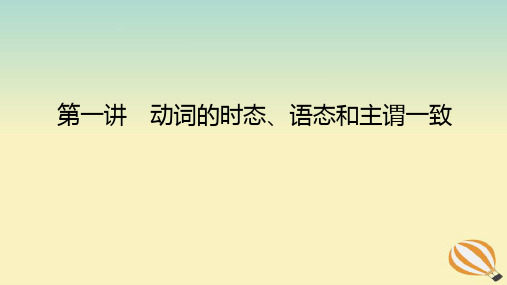
3.熟记固定句型中的时态 (1)be doing...when...,主句常用过去进行时,从句常用一般过去时; (2)It is/has been+时间段+since...表示“自从……以来已经……”,主
句用现在完成时或一般现在时,从句用一般过去时; (3)祈使句+and/or+陈述句,陈述句常用一般将来时。 4.分清主动与被动,辨析语态 看到动词为及物动词,后面缺少宾语,要想到用被动语态。
答案与解析:has increased 动词的时态、语态和主谓一致。根据时间状语 “since 2019”可知,空处应用现在完成时;主语“The use of those plastics”和increase 为主动关系;且主语表单数概念。故填has increased。
6 . Travelling to conferences, lectures, workshops, and the like— frequently by plane—__________ (view) as important for scientists to get together and exchange information.[2022·浙江卷1月为例)
现在时
过去时
将来时
过去将来时
一般时 do/does
英语总复习 单词 & 句型
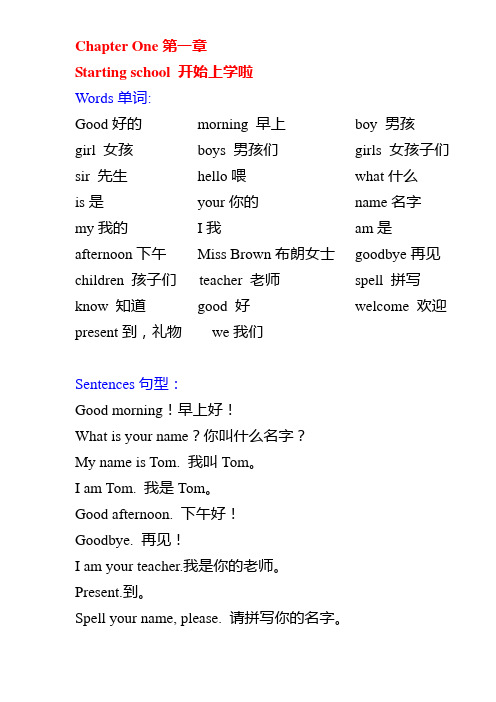
Chapter One第一章Starting school 开始上学啦Words单词:Good好的morning 早上boy 男孩girl 女孩boys 男孩们girls 女孩子们sir 先生hello喂what什么is是your你的name名字my我的I我am是afternoon下午Miss Brown布朗女士 goodbye再见children 孩子们teacher 老师spell 拼写know 知道good 好welcome 欢迎present到,礼物we我们Sentences句型:Good morning!早上好!What is your name?你叫什么名字?My name is Tom. 我叫Tom。
I am Tom. 我是Tom。
Good afternoon. 下午好!Goodbye. 再见!I am your teacher.我是你的老师。
Present.到。
Spell your name, please. 请拼写你的名字。
Chapter Two第二章Nice to meet you见到你很高兴2A单词:father 爸爸mother 妈妈brother 兄弟sister 姐妹friend 朋友classmate 同学my我的this这个is是he他she她2C单词how怎样are 是fine好的thank 谢谢you你in在class 班级book 书come来with和here这里nice好的meet 见面,开会love爱2A 句型:This is Peter 这是Peter.He is my classmate. 他是我同学。
She is my sister. 她是我姐妹。
2C句型:How are you? 你好吗?I am fine, thank you. 我很好,谢谢。
Mary is in Class 1A . Mary 在1A班。
I know Mary. 我知道Mary。
英语总复习教案高中七篇
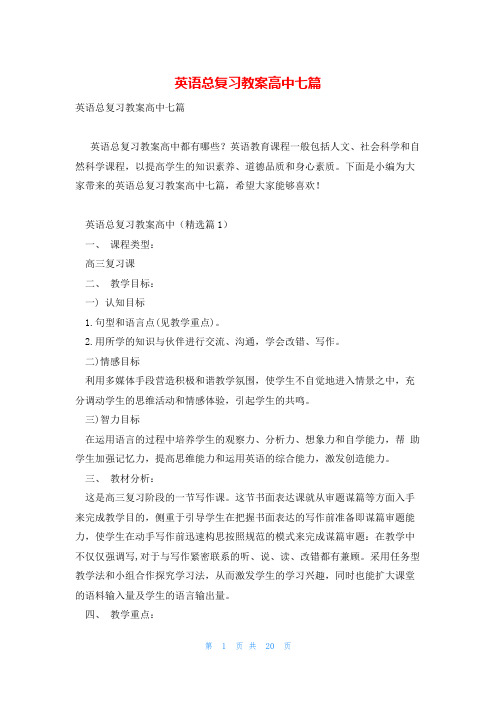
英语总复习教案高中七篇英语总复习教案高中七篇英语总复习教案高中都有哪些?英语教育课程一般包括人文、社会科学和自然科学课程,以提高学生的知识素养、道德品质和身心素质。
下面是小编为大家带来的英语总复习教案高中七篇,希望大家能够喜欢!英语总复习教案高中(精选篇1)一、课程类型:高三复习课二、教学目标:一) 认知目标1.句型和语言点(见教学重点)。
2.用所学的知识与伙伴进行交流、沟通,学会改错、写作。
二)情感目标利用多媒体手段营造积极和谐教学氛围,使学生不自觉地进入情景之中,充分调动学生的思维活动和情感体验,引起学生的共鸣。
三)智力目标在运用语言的过程中培养学生的观察力、分析力、想象力和自学能力,帮助学生加强记忆力,提高思维能力和运用英语的综合能力,激发创造能力。
三、教材分析:这是高三复习阶段的一节写作课。
这节书面表达课就从审题谋篇等方面入手来完成教学目的,侧重于引导学生在把握书面表达的写作前准备即谋篇审题能力,使学生在动手写作前迅速构思按照规范的模式来完成谋篇审题:在教学中不仅仅强调写,对于与写作紧密联系的听、说、读、改错都有兼顾。
采用任务型教学法和小组合作探究学习法,从而激发学生的学习兴趣,同时也能扩大课堂的语料输入量及学生的语言输出量。
四、教学重点:1. 学会审题和谋篇2. 掌握多样化的表达方式3. 熟练各段中的固定写作套路五、教学难点:1. 如何帮助学生运用写作策略,促进学生自主写作。
2. 使学生了解谋篇的重要性,培养谋篇的能力和习惯。
六、教学方法:1、活动教学法:2、任务型教学法:七、教学设计:Step 1. Warming upCome up with some proverbs for the students to put them into Chinese.Recitation is of the first importance in any language learning! Practice makes perfect! …What do you learn from the above proverbsStep 2. PresentationMake it clear to the students the importance of writing in English subject of the college entrance exams and then the goals of this lesson.Step 3. ExhibitionShow on the whiteboard a writing.英语总复习教案高中(精选篇2)一、教学设计意图在《高中英语新课程标准》中讲到“高中英语课程要有利于学生优化英语学习方式,使他们通过观察、体验、探究等积极主动的学习方法,充分发挥自己的学习潜能,形成有效的学习策略,提高自主学习的能力;要有利于学生学会运用多种媒体和信息源,拓宽学习渠道并形成具有个性的学习方法和风格。
小学英语总复习答案

小学英语总复习答案【篇一:小学英语毕业总复习(含部分答案)】p> 一、同音词meet---meat write---right pear---pair sea ---see sun ---sonaunt--- aren t i---egebe---bee high---hi whose谁的--- whos是谁 red---read过去式 green绿色的--- green格林blue蓝色的---blew吹,blow 过去式二、词性转换1.名词变形容词。
名词+ y(ly)=形容词例:rain(雨)—rainy(下雨的), cloud—cloudy, sun—sunny,fun—funny, friend—friendly2.动词变名词。
动词+ er(or)=名词。
例:work—worker,jump—jumper,play—player,learn—learner,visit—visitordrive—driver, run—runner, win—winner等。
【练习:用词的正确形式填空。
】 today is sunny(sun).(i) mother is a writer (write).she is(work) now.三、缩略形式: cant=can notlets=let uswont=will notwasnt=was not四、句子类型句子一般都有动词:①be(am/is/are),②can(may/should/will/must 等),③实义动词(go/play/read/run等,用do/does/did帮助提问或构成否定句。
)结构:主语+be( can,实义动词)+其它。
1.肯定句:是指用肯定的语气来陈述的句子。
如: ①i’m a boy.②he works in a hospital.2.否定句:含有否定词或表示否定意义词的句子。
如: he doesntwork in a hospital.3.一般疑问句:是指询问事实的句子,此类句子必须用“yes”或“no”来回答。
初中英语所有知识点复习大全

初中英语知识归纳总结第一课时名词一、概述1、名词的属性:表示人或事物的名称抽象概念的词叫名词。
2、名词分普通名词和专有名词。
普通名词是表示某一类人或事物,或某种物体或抽象概念的名称。
如:teacher, desks, plates, milk, box等,专有名词表示某一特定的人、事物、地方团体、党派、国家机关、语言、节日等专用的名称。
(运用)如:China, Chinese, Saturday, June, Green, Beijing, Olympic等。
(专有名词的第一个字母要大写)二、可数名词与不可数名词1、可数名词是指表示人或事物,可以用数来计量的名词,有单复数之分。
如:glass-----glasses; book---- books2、不可数名词是指所表示的事物不能用数来计量。
如:paper, rice, water , milk, tea等。
3、有些名词在特定情况下由不可数变为可数名词。
Light travels faster than sound; (light:光线,不可数)The lights are on. (light:灯,可数)4、不可数名词的量的表示不可数名词一般无法用数来计算,前面不能用a或an或数词来表示数量,它的量往往借助于容器来表示。
如:a glass of milk ------ four glasses of milka piece of paper ------ two pieces of papera bag of rice ------ three bags of rice三、可数名词的复数形式(识记、运用)1、可数名词在应用时有单复数之分,单数变复数有规则变化和不规则变化两种。
规则变化2、少数名词有不规则的变化形式policeman---policemen; man---men; woman---women;tooth---teeth; foot---feet; sheep---sheep; deer---deer;Japanese--- Japanese; Chinese --- Chinese; fish --- fish四、名词所有格(运用)名词的所有格是表示所有关系的形式,它也有构成上的变化。
初中英语总复习大全

初中英语总复习大全The document was prepared on January 2, 2021初中英语中考总复习大全目录第一篇词法一、名词(一) 知识概要名词的概念在不同的语法教课书中有不同的解释和分类方法,但就实际应用来讲还是不要过分地追求其理论概念,而更多的要把注意力放在其应用上来。
我们不妨把它分为两大类:专有名词与普通名词。
顾名思义,专有名词是指:个人、事物、机关等所专有的名称,如,the Great Wall, America…它们是不能随意变动的。
而普通名词中则包括个体名词,如pen, worker…它表示单一的个体人或事物;集体名词,如:family,class, team,它表示的是由若干个个体组成的集合体;物质名词,如:water,paper…它表示的是一种物质,原材料;而后一种是抽象名词,如:work, time…它表示着一种在实际生活中看不见、摸不到,但却与实际生活紧密相关的某些动作、状态、品质的抽象概念。
见下表。
名词一览表种类专有名词London, John, the Communist Party of China普通名词类名词 nurse, boy, worker, pencil, dog, table集体名词 class, family, army, police, team, people物质名词 water, steel, glass, cotton, wood, sand抽象名词 happiness, love, work, life, courage, honest功用主语 My family is now in New York.表语 His father is a scientist.宾语 We love our great motherland.宾语补足语 He made London the base for his work.定语 The girls are making paper flowesrs.状语 The car cost him 1000 dollars.同位语 Mr Brown, a famous scientist, will come here.名词在使用中的难点在于名词的数,即可数名词与不可数名词的实际应用。
中考总复习英语必背知识归纳
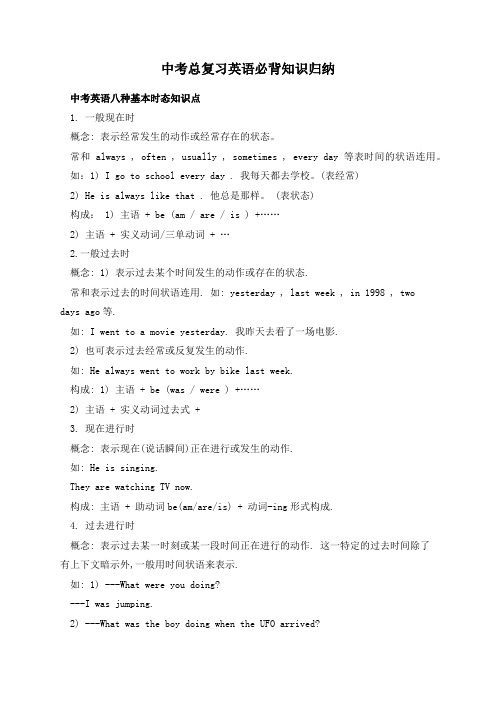
中考总复习英语必背知识归纳中考英语八种基本时态知识点1. 一般现在时概念: 表示经常发生的动作或经常存在的状态。
常和 always , often , usually , sometimes , every day 等表时间的状语连用。
如:1) I go to school every day . 我每天都去学校。
(表经常)2) He is always like that . 他总是那样。
(表状态)构成: 1) 主语+ be (am / are / is ) +……2) 主语 + 实义动词/三单动词+ …2.一般过去时概念: 1) 表示过去某个时间发生的动作或存在的状态.常和表示过去的时间状语连用. 如: yesterday , last week , in 1998 , twodays ago等.如: I went to a movie yesterday. 我昨天去看了一场电影.2) 也可表示过去经常或反复发生的动作.如: He always went to work by bike last week.构成: 1) 主语+ be (was / were ) +……2) 主语 + 实义动词过去式 +3. 现在进行时概念: 表示现在(说话瞬间)正在进行或发生的动作.如: He is singing.They are watching TV now.构成: 主语 + 助动词be(am/are/is) + 动词-ing形式构成.4. 过去进行时概念: 表示过去某一时刻或某一段时间正在进行的动作. 这一特定的过去时间除了有上下文暗示外,一般用时间状语来表示.如: 1) ---What were you doing?---I was jumping.2) ---What was the boy doing when the UFO arrived?---He was sleeping.构成: 主语 + 助动词be(was/were) + 动词-ing形式构成.5. 一般将来时概念: 表示将来某个时间要发生的动作或存在的状态,也表示将来经常或反复发生的动作,常与表示将来的时间状语连用,如: tomorrow, next week, next year, in the future等.如: He will go shopping tomorrow.They are going to play basketball next week.构成: 1) 主语 + 助动词will + 动原+…2) 主语 + be going to + 动原+ ….6. 过去将来时概念: 表示在过去将来的某一时间发生的动作或存在的状态.构成: 1) 主语(第一人称) + 助动词should + 动原+…2) 主语 + would + 动原+ ….3) 主语 + was/ were going to +动原…用法: 过去将来时除了上下文暗示外,一般常用在间接引语中,主句谓语动词为过去时态.如: 1) I should go.2) You knew I would come.3) They were going to Naning.7. 现在完成时构成: 主语 + 助动词 ( have / has ) + 动词过去分词+…用法例句表示过去发生或已经完成的动作对现在造成的影响或结果. ---Have you had your lunch yet?---Yes, I have. (现在我不饿了)8. 过去完成时构成: 主语 + 助动词 had + 动词过去分词+…用法例句表示过去在过去某一时间或动作之前已经发生或完成了的动作.它表示的动作发生的时间是”过去的过去”.表示过去某一时间可用by, before 等构成的短语,也可用when, before, 等引导的从句或者通过上下文表示.I had finished my homework when my mom came back home.中考英语宾语从句知识点宾语从句是指在一个句子中充当宾语的句子,如:He said that he wanted to be a teacher when he grew up.宾语从句的特点:①宾语从句有自己的连接词②宾语从句用陈述语序③宾语从句的时态(1)宾语从句的连接词:宾语从句的连接词包括that、if/whether(是否)、特殊疑问词。
2024版高考英语一轮总复习教材复习Unit4教师用书新人教版必修第一册
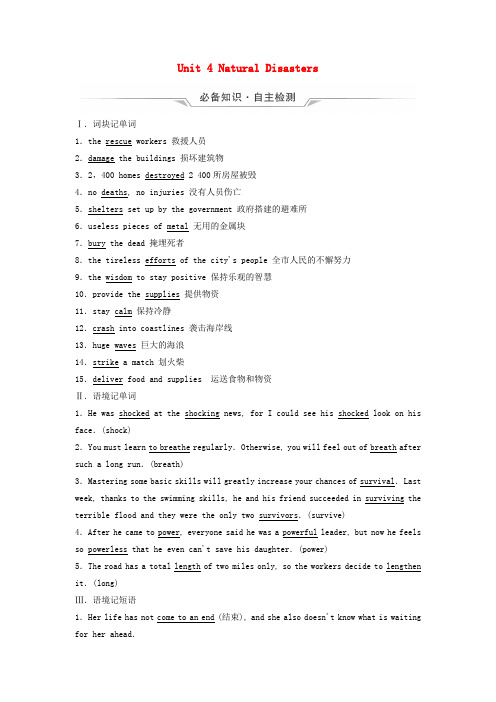
Unit 4 Natural DisastersⅠ.词块记单词1.the rescue workers 救援人员2.damage the buildings 损坏建筑物3.2,400 homes destroyed 2 400所房屋被毁4.no deaths, no injuries 没有人员伤亡5.shelters set up by the government 政府搭建的避难所6.useless pieces of metal 无用的金属块7.bury the dead 掩埋死者8.the tireless efforts of the city's people 全市人民的不懈努力9.the wisdom to stay positive 保持乐观的智慧10.provide the supplies 提供物资11.stay calm 保持冷静12.crash into coastlines 袭击海岸线13.huge waves 巨大的海浪14.strike a match 划火柴15.deliver food and supplies 运送食物和物资Ⅱ.语境记单词1.He was shocked at the shocking news, for I could see his shocked look on his face.(shock)2.You must learn to breathe regularly.Otherwise, you will feel out of breath after such a long run.(breath)3.Mastering some basic skills will greatly increase your chances of survival.Last week, thanks to the swimming skills, he and his friend succeeded in surviving the terrible flood and they were the only two survivors.(survive)4.After he came to power, everyone said he was a powerful leader, but now he feels so powerless that he even can't save his daughter.(power)5.The road has a total length of two miles only, so the workers decide to lengthen it.(long)Ⅲ.语境记短语1.Her life has not come to an end (结束), and she also doesn't know what is waiting for her ahead.2.Although it was Sunday yesterday, Lily got up early as usual (和往常一样).3.Always have your dictionary on hand (在手头) when you study because it is very convenient for you to refer to it.4.We haven't cleaned the house for a few days, because we don't want to sweep away (彻底消除) good luck.5.It was reported that an American couple had dug out (挖出) a lot of gold coins from their own yard.6.The city lay in ruins (成为废墟) after the earthquake.Now, rows of houses are being built.7.Suddenly, a little rabbit jumped out in front of my horse.Seeing this, I was in shock (震惊).Ⅳ.公式练句型1.这个小男孩太小了而不能举起这块沉重的石头。
初中英语总复习知识点归纳(基本全了)
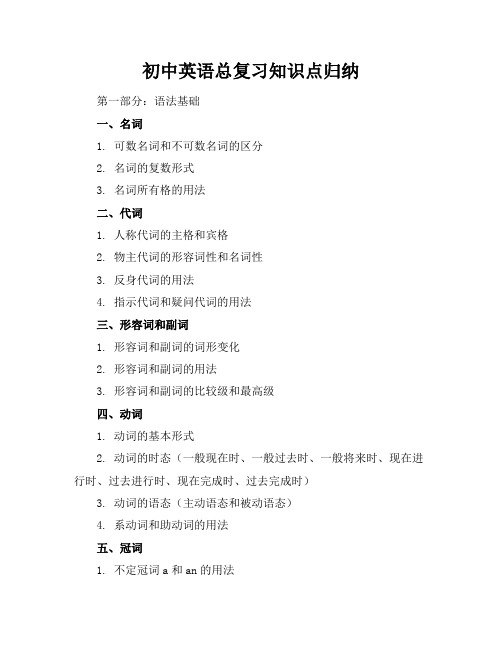
初中英语总复习知识点归纳第一部分:语法基础一、名词1. 可数名词和不可数名词的区分2. 名词的复数形式3. 名词所有格的用法二、代词1. 人称代词的主格和宾格2. 物主代词的形容词性和名词性3. 反身代词的用法4. 指示代词和疑问代词的用法三、形容词和副词1. 形容词和副词的词形变化2. 形容词和副词的用法3. 形容词和副词的比较级和最高级四、动词1. 动词的基本形式2. 动词的时态(一般现在时、一般过去时、一般将来时、现在进行时、过去进行时、现在完成时、过去完成时)3. 动词的语态(主动语态和被动语态)4. 系动词和助动词的用法五、冠词1. 不定冠词a和an的用法2. 定冠词the的用法3. 不使用冠词的情况六、连词1. 并列连词的用法2. 从属连词的用法七、介词1. 常用介词的用法2. 介词短语的结构和用法八、数词1. 基数词和序数词的用法2. 分数、小数和百分数的表达九、感叹词1. 感叹词的用法十、疑问词1. 疑问词的用法十一、句型结构1. 简单句的五种基本句型2. 并列句和复合句的结构和用法十二、主谓一致1. 主谓一致的原则2. 主谓一致的特殊情况十三、倒装句1. 完全倒装和部分倒装的区别2. 常见的倒装句型十四、省略句1. 省略句的结构和用法十五、强调句1. 强调句的结构和用法十六、虚拟语气1. 虚拟语气的用法十七、情态动词1. 情态动词的用法十八、非谓语动词1. 非谓语动词的分类和用法十九、固定搭配1. 常见的固定搭配二十、习惯用语和俚语1. 常见的习惯用语和俚语第二部分:词汇与短语一、词汇记忆方法1. 词根词缀记忆法2. 同义词和反义词记忆法3. 分类记忆法4. 联想记忆法二、常见词汇和短语1. 常用动词短语2. 常用形容词短语3. 常用介词短语4. 常用连词短语5. 常用固定搭配三、词汇辨析1. 形近词辨析2. 意思相近的词辨析3. 语境辨析四、词汇应用1. 词汇在句子中的应用2. 词汇在段落中的应用3. 词汇在文章中的应用五、词汇扩展1. 通过阅读扩展词汇2. 通过听力扩展词汇3. 通过口语和写作扩展词汇六、词汇复习策略1. 制定词汇复习计划2. 定期进行词汇测试3. 反复记忆和复习第三部分:阅读理解一、阅读技巧1. 快速阅读2. 精读3. 猜词技巧4. 理解文章主旨和大意5. 找出文章中的细节信息二、阅读题型1. 主旨大意题2. 细节理解题3. 推理判断题4. 词义猜测题5. 观点态度题三、阅读材料1. 故事类文章2. 议论文3. 说明文4. 应用文5. 新闻报道四、阅读理解策略1. 预览文章和首段2. 扫读文章找出关键词3. 仔细阅读理解文章内容4. 回答问题时注意关键词和语境5. 验证答案是否符合文章内容第四部分:写作技能一、写作技巧1. 确定写作目的和主题2. 拟定写作提纲3. 运用适当的句型和词汇4. 保持文章逻辑清晰5. 注意文章格式和标点符号二、写作题型1. 记叙文2. 议论文3. 说明文4. 应用文5. 日记和书信三、写作素材1. 人物描写2. 地点描写3. 事件描写4. 情感表达5. 观点陈述四、写作策略1. 多读优秀范文2. 多练习写作3. 请教老师和同学4. 反复修改和润色5. 保持写作兴趣和热情第五部分:听力理解一、听力技巧1. 预测听力内容2. 抓住关键词和关键信息4. 边听边记笔记5. 理解对话和独白的逻辑关系二、听力题型1. 简单听力理解题2. 听力细节理解题3. 听力推理判断题4. 听力主旨大意题5. 听力词义猜测题三、听力材料1. 对话2. 独白3. 新闻报道4. 广播节目5. 电影和电视剧片段四、听力理解策略1. 预览问题和选项2. 仔细听录音,注意关键词3. 根据听力内容进行推理和判断4. 选择最符合听力内容的答案5. 检查答案是否符合题意第六部分:口语表达一、口语技巧1. 准备话题和内容3. 保持语速适中4. 注意语法和词汇的准确性5. 保持自信和流畅二、口语题型1. 自我介绍2. 话题讨论3. 角色扮演4. 观点陈述5. 回答问题三、口语素材1. 日常生活话题2. 学校生活话题3. 社会热点话题4. 个人兴趣爱好话题5. 旅游和文化话题四、口语表达策略1. 多听多说,提高口语能力2. 模仿优秀的口语表达3. 与老师和同学进行口语练习4. 参加英语角和口语比赛5. 记录自己的口语表达,进行反思和改进第七部分:综合技能一、综合技巧1. 综合运用语法、词汇、阅读、写作、听力和口语等技能2. 注重语言的实际运用能力3. 提高语言的综合运用水平4. 培养跨文化交际能力5. 保持学习英语的兴趣和动力二、综合题型1. 完形填空2. 阅读理解3. 写作4. 听力理解5. 口语表达三、综合复习策略1. 制定综合复习计划2. 定期进行综合测试3. 反复练习和复习4. 请教老师和同学5. 保持学习英语的兴趣和热情。
小学英语毕业总复习单词分类
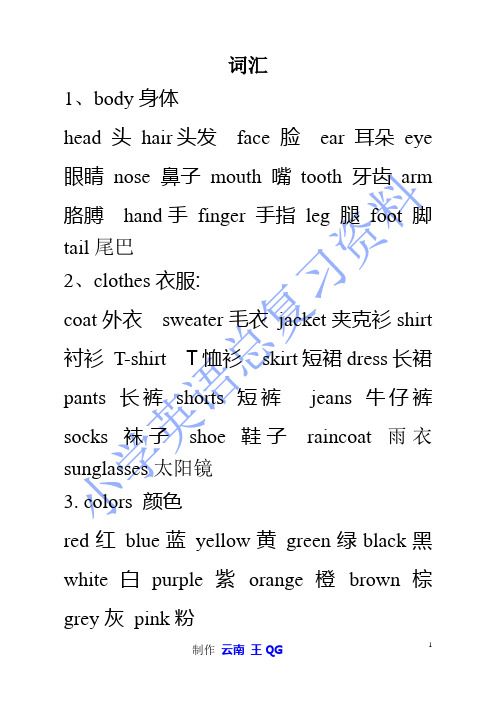
词汇1、body身体head头hair头发face 脸ear 耳朵eye 眼睛nose 鼻子mouth 嘴tooth 牙齿arm 胳膊hand手finger 手指leg 腿foot脚tail尾巴2、clothes衣服:coat外衣sweater毛衣jacket夹克衫shirt 衬衫T-shirt T恤衫skirt短裙dress长裙pants长裤shorts短裤jeans牛仔裤socks袜子shoe鞋子raincoat雨衣sunglasses太阳镜3. colors 颜色red红blue蓝yellow黄green绿black黑white白purple紫orange橙brown棕grey灰pink粉4. jobs职业teacher教师student学生doctor医生nurse 护士driver司机farmer农民singer歌唱家writer作家actor男演员actress女演员artist画家TV reporter电视台记者engineer 工程师accountant会计policeman(男)警察salesperson销售员cleaner清洁工baseball player棒球运动员assistant售货员police 警察5、weather天气hot 炎热cold 寒冷warm暖和cool凉爽sunny 晴天rainy 雨天snowy 雪天windy 刮风天cloudy 多云weather report天气预报6、season季节:Spring春天Summer夏天Fall Autumn 秋天Winter 冬天7、month月份:January一月February二月March三月April四月May五月June 六月July 七月August 八月September九月October十月November十一月December十二月8、week星期:Monday星期一Tuesday星期二Wednesday星期三Thursday星期四Friday星期五Saturday星期六Sunday 星期天9. food食品breakfast早餐lunch午餐dinner/supper晚餐noodles面条rice米饭meat肉soup汤bread面包beef牛肉pork猪肉mutton羊肉chicken鸡肉fish鱼milk牛奶egg蛋tofu 豆腐cake蛋糕hot dog热狗hamburger汉堡包French fries炸薯条10. drink 饮料water水ice-cream冰淇淋Coke可乐juice果汁tea茶coffee咖啡11、fruitapple苹果banana香蕉pear梨strawberry 草莓grape葡萄orange橙watermelon西瓜peach桃12. vegetables 蔬菜eggplant茄子green beans青豆tomato西红柿potato土豆cucumber黄瓜onion洋葱carrot胡萝卜cabbage卷心菜13.family and people家庭人物grandparents祖父母grandma/grandmother (外)祖母grandpa/grandfather(外)祖父parents父母father父亲dad爸爸mother 母亲mom妈妈uncle叔叔aunt姑姑sister 姐妹brother兄弟cousin堂(表)兄弟;堂(表)姐妹son儿子daughter女儿baby 婴儿man男人Mr.先生woman女人lady 女士;小姐Miss小姐boy男孩girl女孩kid 小孩children classmate同学visitor 参观者neighbour邻居principal校长university student大学生pen pal笔友people人物robot机器人friend朋友14.(other things)杂物window窗户curtain窗帘door门desk课桌table桌子chair椅子bed床computer计算机board写字板fan风扇light灯teacher's desk讲台picture图画;照片wall墙壁floor地板trash bin垃圾箱closet壁橱mirror镜子end table床头柜football足球present礼物walkman随身听lamp台灯phone电话sofa沙发shelf书架fridge冰箱TV电视air-conditioner空调key钥匙lock锁photo照片plate盘子knife刀fork 叉spoon勺子chopsticks筷子pot锅gift 娃ball球kite风筝box盒子umbrella伞violin小提琴menu菜单e-card电子卡片e-mail电子邮件traffic light交通灯money 钱medicine药15. 地点east东west西south南north北left 左边right右边home家room房间bedroom卧室bathroom卫生间living room起居室kitchen厨房study书房school学校classroom教室playground操场canteen食堂garden花园teacher's office教师办公室library图书馆gym体育馆washroom卫生间art room绘画教室computer room计算机教室music room音乐教室TV room电视机房country国家village乡村city城市hometown家乡park公园nature park自然公园theme park主题公园library图书馆post office邮局police office(station)警察局hospital医院cinema电影院bookstore书店farm农场zoo动物园company公司factory 工厂fruit stand水果摊pet shop宠物商店science museum科学博物馆supermarket超市bank银行bus stop公交车站the Great Wall长城16.出行train火车subway地铁car小汽车bus公共汽车taxi出租车plane飞机motor cycle 摩托车bike自行车ship轮船boat小船foot(脚)17. 国家China(PRC)中国America(USA)美国England(UK)英国Japan(JAP)日本Canada (CAN)加拿大Australia 澳大利亚18、nature景物river河流lake湖泊stream河;溪forest 森林path小道road公路house房子bridge桥building建筑物rain雨cloud云sun太阳mountain山sky天空rainbow彩虹wind风air空气moon月亮19.animals动物cat猫dog狗pig猪duck鸭rabbit兔snake 蛇bird鸟fish鱼horse马mouse老鼠elephant 大象ant蚂蚁kangaroo袋鼠panda熊猫bear熊lion狮子tiger老虎fox狐狸zebra 斑马deer鹿giraffe长颈鹿goose鹅hen 母鸡lamb小羊sheep绵羊goat山羊cow 奶牛monkey猴donkey驴20、植物(plants)flower花grass草rose玫瑰plant植物tree树seed种子leaf叶子21. numbers数词one一two二three三four四five五six 六seven七eight八nine九ten十eleven 十一twelve十二thirteen十三fourteen十四fifteen十五sixteen十六seventeen十七eighteen十八nineteen十九twenty二十thirty三十forty四十fifty五十sixty六十seventy七十eighty八十ninety九十forty-two四十二hundred百one/a hundred and thirty-six一百三十六first second third fourth fifth sixth seventh eighth ninth tenth eleventh twelfth thirteenth fourteenth22.school thingspen (钢笔)pencil (铅笔)pencil-case ( 铅笔盒)ruler(尺)Eraser(橡皮)crayon(蜡笔)book (书)bag (书包)sharpener (卷笔刀) comic book(漫画书)post card明信片newspaper(报纸)magazine (杂志)Chinese book English book(英语书)math book(数学书)story-book(故事书) notebook(笔记本)23. 课程(classes)Chinese(语文)math(数学)science科学English(英语)P.E.(体育)Moral Education 思想品德课Social Studies社会课music(音乐) computer (电脑)24.动词及短语play玩;踢swim游泳skate滑冰fly飞jump跳walk走run跑climb爬fight打架swing荡eat吃sleep睡觉like像,喜欢have有;吃turn转弯buy买take买;带live居住teach教go去study学习learn 学习sing唱歌dance跳舞row划do做meet见面welcome欢迎love爱drink喝look看guess猜help帮助pass传递show 展示use使用clean打扫wear穿open打开close关上put放tell告诉ride骑think想,思考fall落下leave离开do homework做作业do housework做家务do morning exercises晨练do the dishes洗碗碟do an experiment做实验go to school上学go hiking去远足,去郊游go home回家go to bed上床睡觉go straight向前直走go shopping买东西go to the cinema去看电影watch TV看电视read books读书cook the meals做饭water the flowers浇花sweep the floor扫地clean the bedroom打扫卧室make the bed铺床set the table摆饭桌wash the clothes洗衣服use a computer使用计算机;做广播操eat breakfast吃早饭have dinner吃晚饭eat vegetable have English class上英语课play sports进行体育运动get up起床climb mountains爬山play the piano弹钢琴visit grandparents看望(外)祖父母fly kites放风筝make a snowman堆雪人plant trees种树draw pictures画画cook dinner做饭read a book看书answer the phone接电话listen to music听音乐clean the room打扫房间write a letter写信write an e-mail写电子邮件drink water喝水take pictures照相watch insects观察昆虫pick up leaves采摘树叶catch butterflies捉蝴蝶count insects数昆虫collect insects收集昆虫collect leaves收集树叶write a report写报告play chess下棋have a picnic 举行野餐get to到达ride a bike骑自行车play the violin拉小提琴make kites制作风筝collect stamps集邮wake up醒来wear 穿play computer games玩电脑游戏play chess下棋empty the trash倒垃圾put away the clothes收拾衣服take a trip去旅行read a magazine阅读杂志put on穿上take off脱掉get on 上车get off下车turn on打开turn off关掉25.疑问代词where when why who whom whose how many ,how much ,how old ,how tall, how heavy, how big, how large ,how long, what, what color, what day26.形容词big 大的small 小的cheap 便宜的expensive 贵的long 长的short 短的fat 胖的thin瘦的old 老的young 年青的beautiful漂亮的pretty可爱的strong 强壮的quiet 安静的cute 漂亮的lovely 可爱的tall 高的funny 有趣的kind 慈祥的strict 严格的smart 机灵的active 活跃的new 新的tired疲劳的,累的excited兴奋的happy高兴的angry生气的bored无聊的,烦人的sad 忧伤的,悲伤的tasty 美味sweet 甜sour 酸salty 咸colourful 多彩的fresh 新鲜的right对的hungry饥饿的helpful有帮助的high高的easy简单的sick有病的favourite最喜爱的clean干净的nice好看的。
英语.新高考总复习必修2 Module 1 Our Body and Healthy Habits
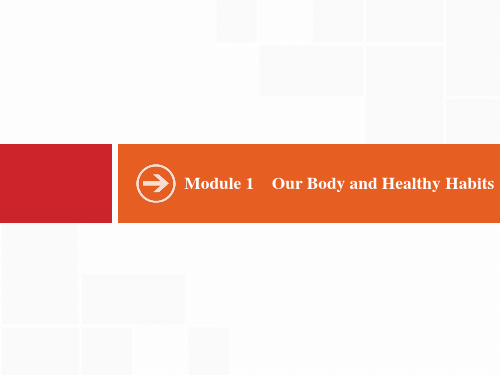
考纲单词分层 常用短语
重点句型 主题语篇填空
-5-
10.pneumonia n.
肺炎
11.prescription n.
处方
12.symptom n.
症状
13.X-ray n.
X光
14.insurance n.
保险
15.questionnaire n.
问卷;问卷调查;调查表
必修2
Module 1 Our Body and Healthy Habits
7. breathe vi. 呼吸→ breath n. 呼吸;气息→
breathless adj.喘不过气来的
必修2
Module 1 Our Body and Healthy Habits
考纲单词分层 常用短语
重点句型 主题语篇填空
-8-
『语境活用』 1.Seeing me looking anxious ,she asked me anxiously what had caused my anxiety .(anxious) 2.Oh,let’s take a breath .I can hardly breathe .(breath) 3.His foot was injured ,so he couldn’t take part in the sports meet because of his injury .(injure) 4. Normally ,the weather is fine at this time of the year,so this
Module 1 Our Body and Healthy Habits
必修2
Module 1 Our Body and Healthy Habits
高考英语总复习资料
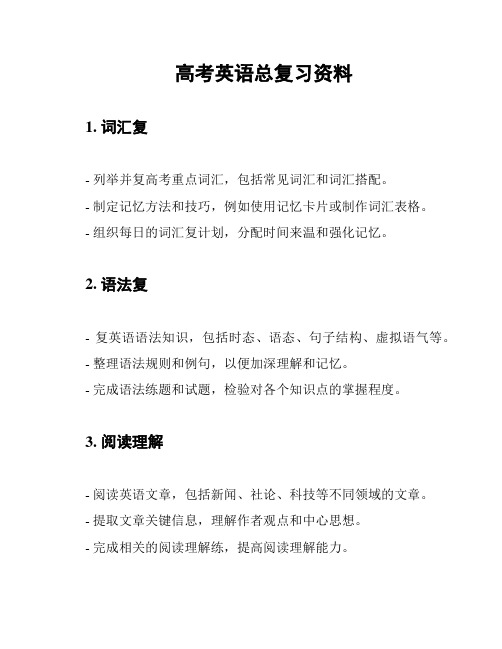
高考英语总复习资料
1. 词汇复
- 列举并复高考重点词汇,包括常见词汇和词汇搭配。
- 制定记忆方法和技巧,例如使用记忆卡片或制作词汇表格。
- 组织每日的词汇复计划,分配时间来温和强化记忆。
2. 语法复
- 复英语语法知识,包括时态、语态、句子结构、虚拟语气等。
- 整理语法规则和例句,以便加深理解和记忆。
- 完成语法练题和试题,检验对各个知识点的掌握程度。
3. 阅读理解
- 阅读英语文章,包括新闻、社论、科技等不同领域的文章。
- 提取文章关键信息,理解作者观点和中心思想。
- 完成相关的阅读理解练,提高阅读理解能力。
4. 写作技巧
- 复常见的写作题型,如议论文、说明文、图表描述等。
- 练写作,包括写作素材积累、句型转换和写作模板应用等。
- 修订和编辑自己的作文,提高写作表达和语言流畅度。
5. 听力训练
- 增加英语听力的曝光量,包括听新闻广播、观看英语电影等。
- 分析听力材料,提取关键信息和理解说话者意图。
- 完成听力练,提高听力的理解和反应速度。
以上是高考英语总复习资料的基本内容,希望对你的备考有所
帮助。
记住要制定合理的学习计划,持续地进行复习和练习,相信
你一定能取得好成绩!。
- 1、下载文档前请自行甄别文档内容的完整性,平台不提供额外的编辑、内容补充、找答案等附加服务。
- 2、"仅部分预览"的文档,不可在线预览部分如存在完整性等问题,可反馈申请退款(可完整预览的文档不适用该条件!)。
- 3、如文档侵犯您的权益,请联系客服反馈,我们会尽快为您处理(人工客服工作时间:9:00-18:30)。
英语总复习I. 选择填空(本题共20小题,每小题1分,满分20分)从A、B、C、D四个选项中,选出可以填入空白处的最佳答案。
()26.Look, Mary _______ a newspaper in the classroom.A . is readingB . reads C. read D. has read()27,Lin Tao goes to the doctor's Sunday afternoon.A. on B . in C. at D. of()28.They a picnic if it is fine tomorrow.A. have B .will have C.had D .are having()29.There is some tea in the cup, isn't ?A. it B . that C. this D . there()30.I hear a new library will in our town next year.A. be building B .build C.be built D.building()31.Can I read here minutes longer?A. a fewB. fewC. a littleD. little()32.Someone at the door when she was cooking in the kitchen.A. had knocked B . has knocked C.knocks D. knocked()33.The students were asked take the books out of the library.A. to not toB. notC. not to D . /()34.---Peter, can you tell me where is Tom?---He to the gym.A. has goneB. had gone C . has been D . had been( )35.---It's good for you to take exercise.---Yes, It has me good.A . given B. wanted C. done D.helped()36.---Do you know who the America?---Oh a great sailor did.A . inventedB . founded C. discovered D. noticed(37.---Look ! The man at the gate be our headmaster .He is always standing there every morning.--- No, it be him , He is having a meeting in the office now.A. must , can't B . must, mustn't C. can , can't D. can , mustn't()38.--- I didn't know this was a one - way street , officer.---A. That's all rightB. I don't believe youC.How dare you say that?D. Sorry , but that's no excuse.()39. --- My basketball shoes are--- How long have you then?A. tired , borrowed B . worn , had C. put , bought D .looked , kept ()40. --- Our neighbours often visit the old woman, so she doesn't feel at all.--- How kind they are!A.friendlyB. lovelyC. livelD.lonely()41.--- I have lost a chance to go to Beijing University.--- .A .You're luckyB .What a pity! C. Congratulations! D.I'm sorry.()42 --- Dad! I the first prize in the English listening competition.--- Congratulations! You are great.A. lost B . won C. failed D .succeeded()43.--- What happened over there?--- Oh, a girl a bike and broke her left leg.A. got offB.put offC.drove offD.fell off()44. --- How do people usually in the office?--- Different people wear different clothes.A. put on B .dress up C.dress D.wear()45. --- Why is your father so angry?--- Oh , he is out of the factory by his boss.A.put B .taken C .driven D.broughtII, 完形填空(本题共20小题,每小题1分,满分20分)阅读下面的两篇短文,掌握其大意,然后从各题所给的四个选项上选出一个最佳答案。
AMike is a hardworking student. He likes reading, but he doesn't pay any 46 to where to read. He forms(形成)the bad habits of 47 .Sometimes he likes reading 48 the sun. In the evening , he is always reading in the moonlight. When he goes to school , he is reading as he is walking on the way and riding on a bus . When he has his meals, he is reading as he is eating . While he is 49 in bed, he is also doing his reading. 50 , his eyes go wrong . He just can't see things clearly, So we should take care of our eyes everywhere at any time.()46.A. money B. attention C. time D. care()47.A. reading B. lying C. writing D. thinking()48.A.at B .on C.under D.in()49.A.making B .going C.lying D.standing()50.A.At first B.At once C.At times D.At lastBOnce a young man was travelling by train. It was a long and boring journey.As the train was moving 51 a wilderness(荒野), the passengers looked out of the windows 52 , When the train reached a bend( 转弯处), it slowed down and then a simple house 53 . It was so easy to notice that everybody on the train turned to "enjoy" with eyes wide open . Some passengers even began a 54 about it. The young man was also attracted by the scenery. On his return he 55 the train at the nearest station and found his way to the house. Its owner said that he was troubled by the 56 of the train. He wanted to 57 the house, but nobody would buy it.Soon the young man 58 30 000 dollars on the house. He thought it was a good place for 59 because it was facing the railway bend. When the train moved slowly past, the 60 passengers would be very interested in the house.He 61 to connect with some big companies and told them that could be used for advertisement.62 the Coca- Cola Company took it to 63 their signs. To everyone's surprise, the young man was 64 180 000 dollars for a three- year rent(租金).This is a true story. It tells us that discovery is very important to 65 .Many people have got new ideas from it.()51.A. over B. around C. through D. across()52.A. happily B. quietly C. safely D. clearly()53.A. appeared B. showed C. found D. came()54.A. discussion B. rneeting C. subject D. competition()55.A. got on B. looked for C. got off D. waited for()56.A. conductors B. noise C. sound D. passengers()57.A. change B. paint C. sell D. build()58.A. took B. spent C. cost D. paid()59.A. information B . relaxing C. travelling D. advertisement()60.A. tired B. excited C. surprised D. worried()61.A. had B. tried C. agreed D. stopped()62.A. Since then B. At first C. In the end D So far()63.A. put up B. put on C. put down D. put off()64.A. shown B . allowed C. offered D. returned()65.A. success B. confidence C. challenge D . invention III. 阅读理解(本题共15小题,每小题2分,满分30分)阅读下列三篇短文,从各题所给的四个选项上,选出最佳选项。
